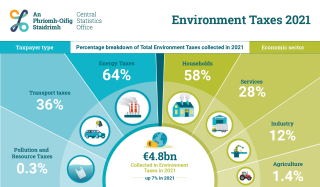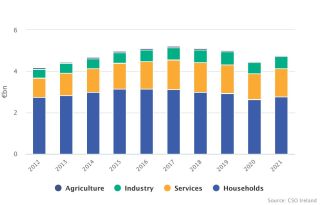Environment taxes in Ireland

The most recent data on environmental taxes in Ireland relates to 2021 and was published in by the Central Statistics Office in July. The data shows a total of €4.8 billion of environment related taxes were collected in 2021 and that Pollution and Resource taxes made up 0.3% of total Environment taxes in 2021. Looking at environmental taxes over the past decade, they amounted to €4.2 billion in 2012, and rose to €5.2 billion in 2017, before falling to €4.5 billion in 2020 on foot of the COVID-19 pandemic and rose to €4.8 billion in 2021.As a percentage of total taxes, environment taxes were 9% in 2012, while in 2021 they accounted for 6% of total taxes.
Environment Taxes 2021
An environmental tax is defined as s tax whose tax base is a physical unit of something that has a proven, specific negative impact on the environment, and which is identified in the European System of Accounts as a tax.
Total Environment taxes collected in 2021 amounted to €4.8 billion
- A total of €4.8 billion of environment related taxes were collected in 2021.
- Energy taxes, which include transport fuels, accounted for 64% of all environment related taxes in 2021.
- Transport taxes (including motor tax and vehicle registration tax) accounted for 36% of all environment related taxes in 2021.
- Pollution and Resource taxes accounted for 0.3% of Environment taxes in 2021.
Tax collected by taxpayer type
Energy taxes (mainly fuel and carbon) = €3.1 billion
Transport taxes (mainly VRT and motor tax) = €1.7 billion
Pollution and Resource taxes (Plastic bags, Fisheries and Landfill) = €0.013 billion
Tax collected by economic sector of payee
Households = €2.8 billion
Services = €1.4 billion
Industry = €0.6 billion
Agriculture = €0.068 billion
Energy taxes in 2021 were €3.1 billion. Taxes on transport fuels (hydrocarbon oils) accounted for 63% of energy taxes while the combined Carbon tax, Carbon credits and the PSO levy accounted for 33% of energy taxes. Carbon tax increased by 31% to €659 million in 2021. Transport taxes (mainly vehicle registration and motor taxes) were €1.7 billion with vehicle registration tax accounting for 44% of transport taxes. Pollution and resource taxes were €13 million in 2021.
Environment Taxes over time
In 2012 estimated environment taxes levied on households were €2.8 billion (see Table 1), representing a 66% share of total environment taxes. In 2021 household environment taxes stood at €2.8 billion and represent a 58% share of total environment taxes. Looking at service industries, environmental taxes levied on service industries were €1.4 billion in 2021, representing a 28% share of total environment taxes.
Moving to industry, environment taxes levied on industry in 2021 were €0.6 billion, representing a 12% share of total environment taxes.
Finally, looking at agriculture, environment taxes levied on agriculture were €0.07 billion in 2021 and represented a 1.4% share of total environment taxes.
Figure 1: Environment Taxes by NACE Sector of Payee, 2012 - 2021

Categories of Environment Taxes
Energy taxes (including fuel for transport): This category includes taxes on energy production and energy products, including taxes on fuels for transport and stationary purposes. By definition Carbon taxes are included as an Energy tax rather than a Pollution tax, largely to aid international comparability. In Ireland’s case, taxes on transport fuels make up the bulk of energy taxes.
Transport taxes: This category includes taxes related to the ownership and use of motor vehicles. In Ireland this mainly relates to Vehicle Registration Tax (VRT) and Motor tax.
Pollution taxes: This category includes taxes levied on emissions to air and water, management of solid waste and noise. Carbon taxes are not included in this category. There are four taxes classified as Pollution or Resource taxes, namely a Landfill levy, a Plastic bag levy, a Fisheries levy and a Petroleum Act levy.
Resource taxes: Included are taxes linked to the extraction or use of natural resources. Taxes on land are generally not included, nor are taxes designed to capture the resource rent from the extraction of natural resources. There are four taxes classified as Pollution or Resource taxes, namely a Landfill levy, a Plastic bag levy, a Fisheries levy and a Petroleum Act levy.
Social Justice Ireland view – Environment taxes
Any programme for Just Transition, meeting our climate goals, moving to a carbon neutral economy and sustainable development has implications for public spending. In addressing this issue, it must be understood that public expenditure programmes and taxes provide a framework which help to shape market prices, reward certain activities and penalise others. A key aspect of this could be to broaden the tax base through environmental taxation. Eco-taxes, which put a price on the full costs of resource extraction and pollution, would help with the transition towards a resource efficient, low carbon, green economy. The taxation system should reflect the environmental costs of goods and services. Carbon tax plays a key part in this regard.
Social Justice Ireland has consistently proposed that revenues from carbon taxes are used to support households in energy poverty to improve energy efficiency and in low carbon technologies to improve the energy efficiency of the housing stock.
In designing taxes or incentives transitional measures, regional differentiation, the availability of alternatives and differences in purchasing power should all be taken into account. When designing environmental taxes it is vital that revenues generated should be used to offset any regressive impacts. When considering environmental taxation measures to support sustainable development and the environment, and to broaden the tax base, the Government should ensure that such taxes are structured in ways that are equitable and effective and do not place a disproportionate burden on rural communities or lower socio-economic groups. The European Commission has recommended the use of economic instruments such as taxation to ensure that product prices better reflect environmental costs.
Subsidies are also an element of the environmental tax code that should be reviewed. Fossil fuel subsidies amounted to €2.2bn in 2020.
Eliminating these subsidies mean that government has a wider fiscal space available to it in terms of climate policy and taxation. In terms of overall public expenditure, systematic reviews should be carried out and published on the sustainability impacts and implications of all public subsidies and other relevant public expenditure and tax differentials. Subsidies which encourage activity that is damaging to natural, environmental and social resources should be abolished.
Environmental taxation, enforcing the polluter pays principle, and encouraging waste prevention can help to decouple growth from the use of resources and support the shift towards a low carbon economy. Incorporating social and environmental costs in regulating and pricing both goods and services, combined with promoting those goods and services which are sustainable, should become part of sustainable development policy.